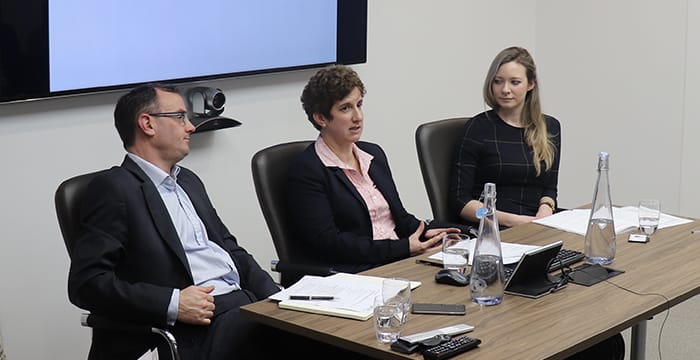Womble Bond Dickinson trio consider how future lawyers should be thinking about technology

At ‘How tech is changing finance, retail and the law — with Womble Bond Dickinson’ earlier this month, three lawyers from different areas of the firm’s business got together to take questions from an audience over 40 students.
Together they cut through the hype to pinpoint five key ways that future lawyers need to be thinking about the technological developments shaking up law and business.
1. Clients’ businesses
As a corporate lawyer, the most important aspect of the ‘Fourth Industrial Revolution’ sweeping society is what it means for the companies you advise. “It’s important to keep up with developments and be able to constantly show clients that you understand the technological upheaval they are facing,” says Womble Bond Dickinson’s Alistair Walton, a partner in the firm’s commercial property team. Walton is currently advising a host of big name retail clients, such as New Look, as they re-orient their businesses in a bid to deal with the online ‘Amazon effect’ sweeping the sector.
While legal expertise is paramount, the wider commercial and strategic expertise of lawyers is also valued, notes fellow Womble Bond Dickinson solicitors Katherine Crowley and Imogen Armstrong, who spoke alongside Walton at the Legal Cheek event, hosted at the transatlantic firm’s Southampton office.
“If you take the Big Four accountancy firms they are not just accountants but consultants, and law is going that way as lawyers assume a dual role as business consultants and trusted advisors,” says practice development manager Crowley.
2. The law
While some new technology can be effectively governed by existing law, other more disruptive changes require legislation to be applied in a different way. Sometimes new rules are even required. “The law can be quite slow to catch up with technology — and as we are now seeing with social media, it can lag behind and require social pressure in order to change and keep it,” says commercial law solicitor Armstrong.
"Don't be scared and live a little", says Womble Bond Dickinson solicitor
Don't be afraid to go out and gain new experiences – you will pick up transferable skills "absolutely relevant" to your career in law, says Womble Bond Dickinson UK LLP Careers solicitor, Imogen Armstrong
Posted by Legal Cheek on Wednesday, 27 February 2019
A high-profile example of new law created in response to technological change is GDPR. “Since coming in last year it has focused people’s minds about the way they treat data, and as a lawyer it’s exciting to be at the forefront of legal developments,” she added.
3. Lawtech
The legal profession doesn’t exist in a bubble. The same forces that are shaking up wider society are also impacting on the way lawyers work. Indeed, the term lawtech is becoming increasingly well-known as tech innovators turn their attention to law firms.
As one of the key individuals at Womble Bond Dickinson responsible for embedding new artificial intelligence-driven products such as Kira Systems into the firm, Crowley is well-positioned to judge the fast-moving lawtech scene.
“Tech doesn’t make mistakes, get grumpy or need caffeine, but it’s not a 100% win. At some things I’m better than Kira. We need to work together,” she says.
Crowley — a former magic circle lawyer who actively sought out a new tech-led challenge in her career — reckons that lawtech presents a particularly good opportunity for midsize international law firms like Womble Bond Dickinson “to grab a bigger slice of the legal cake”. In the past, lacking the manpower of the biggest global firms they may have missed out on certain large-scale transactions or cases. Now, with sophisticated use of cutting edge software to drastically reduce the need for grunt work, they can compete more effectively than ever before.
4. Agile working
Agile working may sound less exciting than AI, but it could well prove to have a more profound effect on the legal profession than any other change arising from technology. Having begun his career when the internet was at a much earlier stage, Walton has observed a major shift in working practices. A few years ago everyone came into the office everyday, now “I don’t know where half my team is,” he quips.
London-based Womble Bond Dickinson UK LLP Careers practice development manager, Katherine Crowley, reveals why she likes working in a law firm with offices in "multi-locations".
Posted by Legal Cheek on Tuesday, 26 February 2019
Laptops, iPhone and slick IT systems enable Womble Bond Dickinson lawyers to flit between its offices; a case in point is Crowley — after speaking at the Legal Cheek event in Southampton, she was heading up to the firm’s office in Leeds and then planning to work down in Plymouth for two days at the beginning of next week before returning to her base in London. Agile working is also helping more lawyers with young families to progress their careers while not being in the office all of the time.
5. Positive mindset
More than anything else, tech presents an opportunity for future lawyers. “If you have a mindset that is open to working in different ways, can spot opportunities, try out new things, and accept that you sometimes might fail, then this is a great time to be entering the profession,” says Crowley.
Technology and innovation are high on most law firms' agendas – so expect these topics to come up during interviews, says Womble Bond Dickinson UK LLP Careers partner Alistair Walton
Posted by Legal Cheek on Monday, 25 February 2019
Agreeing, Walton gives the example of Sam Dixon, a Womble Bond Dickinson managing associate who learnt in detail about a particular lawtech product the firm is using, developed his own coding ability, and “wrote a programme for it that has revolutionised the way it works for us” — and boosted his career in the process.
Expect many similar stories of enterprising lawyers improving the way their firms work in the future.


